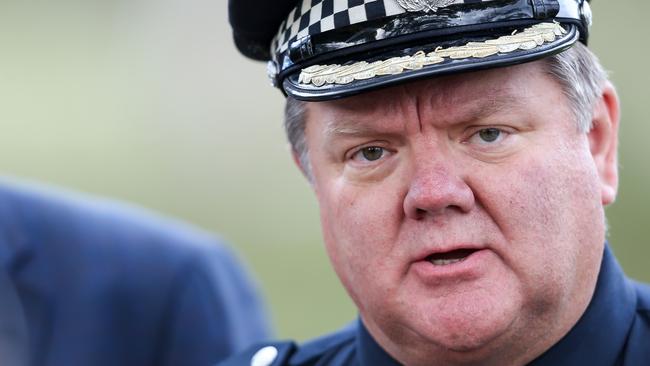Senior Victoria Police figures savaged for their denials over Lawyer X
Two of Victoria Police’s most senior figures have been savaged by the bombshell Lawyer X royal commission report.

Two of Victoria Police’s most senior figures have been savaged by the bombshell Lawyer X royal commission report, which has challenged their evidence about when they learned of Nicola Gobbo’s double-dealing.
Counsel assisting the commission’s recommendations against assistant commissioner Luke Cornelius and Findlay McRae, police command’s most senior lawyer, have thrown a blow to the reputation of police command.
Chris Winneke QC repeatedly and forcefully cast doubt on their claims they were unaware for several critical years that Ms Gobbo was informing on her gang-war clients.
In his 3000-page report, Mr Winneke recommended Lawyer X royal commissioner Margaret McMurdo QC make adverse findings against both men.
Mr Cornelius’s former role leading Victoria Police’s ethical standards unit reinforced concerns about his failure to act earlier about the conduct of Ms Gobbo, Mr Winneke found.
“If the commissioner accepts that Mr Cornelius became aware of Ms Gobbo’s role as a human source in mid-2006, it is open to the commissioner to find that as assistant commissioner, Ethical Standards Department, being the unit responsible for maintaining ethical standards within the police force, he should have insisted on the obtaining of legal advice (and) insisted on measures being put in place to ensure that in the use of Ms Gobbo as a human source, and in the handling of any information received from her, there was no potential to adversely affect the proper administration of justice.”
Mr Cornelius told the commission he didn’t become aware of the full extent of Gobbo’s secret informer role until the Herald Sun broke the story in 2014.
In his response to Mr Winneke’s recommendations, Mr Cornelius says the proposition is “circumstantial, based on unfounded assumptions and speculation”.
Mr Winneke was also critical of Mr McRae’s evidence over a letter from Ms Gobbo to Victoria Police. “It is open to the commissioner to reject Mr McRae’s evidence that he did not read Ms Gobbo’s 7 September, 2009, letter ‘word for word’, and to find instead he read and understood the letter, including the significance of a reference to Ms Gobbo’s ‘previous unprecedented assistance (2005-09)’.” he said.
“If it is accepted that … Mr McRae knew Ms Gobbo’s role as a human source had not been disclosed or revealed during any legal proceedings, on the evidence it is open to the commissioner to find that from that date, Mr McRae failed to ensure measures had been or were to be taken to ensure that Ms Gobbo’s role was disclosed to people whose cases may have been affected by it.”
Mr Cornelius, now in charge of police operations in the city of Melbourne, told the royal commission he didn’t become aware Ms Gobbo was informing on her clients until 2009.
Mr Winneke draws on critical meetings in 2006 and the letter written by Ms Gobbo in 2009 in challenging this. “It is open to the commissioner to find that all present at the meeting on 6 June, 2006, including Mr Cornelius … were told by (Simon) Overland that Ms Gobbo was a registered human source.”
Mr Winneke then highlights a second meeting, on July 27, 2006, attended by former chief commissioners Mr Overland and Graham Ashton at which a decision was made not to call Ms Gobbo to a hearing of the OPI, the former police corruption body.
“There appears to be no record of the meeting, at which a decision was made to effectively neuter the OPI involvement in a joint agency investigation, which involved allegations of serious corruption on the part of members and former members of Victoria Police.”



